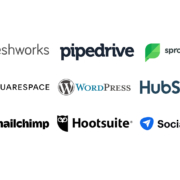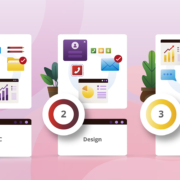The Benefits of Blogging for Business — and How to Get Started
Blogging is a powerful tool in content marketing strategy, providing a range of benefits that can significantly impact your business’s bottom line. But for those who are less confident in their writing skills, it’s often a digital marketing strategy that gets put on the back burner.
But no more! Whether you’re a new business starting out or an older business ready to try your hand with online marketing, it’s worth trying to see how your website visitor numbers rise. You’re here reading this blog right now, aren’t you? Point: Lift Marketing.
Increase Website Traffic
First things first; you want website visitors, right? Fresh, high-quality content brings more visitors to your site through search engines and shares on social media. How do you consistently add more content to your site? You guessed it, blogs.
Improve SEO
Search engines want to answer people’s searches, so they prioritize websites that they think answer the searches people are throwing out there. A blog is the best way to put out relevant content that search engines eat up — and that readers want to see.
Be a Thought Leader
When you share your knowledge and expertise with readers on a blog, you show readers (and potential customers) that you know what you’re talking about. It’s as simple as that! Publish content that shows your readers – and the SEO crawlers – that you’re an industry leader worth listening to.
Brand Awareness
Consistent blogging, especially when coupled with promotion, increases your visibility and reach. As you blog about topics related to your business, you get your brand name and message in front of more potential customers.
Lead Generation
Quality blog content drives traffic to your website and converts visitors into leads. Include calls to action in your posts to capture emails and generate sales inquiries. Blogging is a proven tactic for driving more leads.
Promoting and Distributing Your Blog Content
So you wrote a new blog. Now what?
Once you’ve created high-quality blog content, it’s time to get it in front of your target audience. Don’t know where to start? Let’s take a look at where to find your blog readers.
Leverage Social Networks
Utilizing social media marketing and promoting your blog posts on platforms like Facebook, X (or “Twitter” if you’re old school), LinkedIn, and Pinterest is a great way to get your content out there. Share your posts organically on your social media platforms or consider running paid promotions to expand your reach. Engage with others in your niche by commenting on relevant posts and joining Facebook groups.
Email Marketing
Send your blog posts out to your email list to generate more traction. Dedicated emails with your newest content tend to perform better than overly-promotional newsletters. Just make sure that the content is the star. Consider adding the blog post to automated email sequences to continually put it in front of leads and customers.
Guest Blogging
Approach other blogging platforms and websites in your industry about contributing a guest post. This is a great way to tap into an already engaged audience and get more exposure for your own blog. Having the ability to build relationships with other bloggers can also yield more opportunities later. Make sure to include a brief bio with a backlink to your website.
Link Building
An effective link building strategy can direct more organic search traffic to your blog over time. Reach out to partners and websites in your space about swapping guest posts and backlinks. Look for opportunities to naturally mention and link to your content when networking online.
The key is to leverage every channel possible to distribute your content far and wide. Be creative and strategic with promotion, and your blog will continue reaching and influencing more of your target audience.
Search Engine Optimization
You always want new content on your site, and it’s worth it to put in the extra effort to make sure it’s SEO-focused. This way, you can get the most out of your blog’s benefits.
Keyword Research
Before you go in-depth into research on a specific topic, make sure people are actually searching for that. Keyword research lets you find topics and questions that real people are actively searching for. Check out search volume and competition for topics and keywords and then focus your blog article around that.
Meta Descriptions
The meta description of a page is displayed on the search engine results page when someone searches for a related term. The main goal of a meta description is to entice the person to click the link — so write more for humans and less for Google crawlers.
Inbound Links
Just like how outbound links and backlinks help build your link building strategy, inbound links within your own blog that link to other relevant pages help the search engines index and determine how relevant your content is.
Alt Text
Did you know that you can get more SEO value out of your page from your images? Google (and other search engines) prefer it when images have alt text (also referred to as “alt tags”) that accurately describe the image — bonus points if you include some SEO keywords in there.
It all goes back to the user experience. Alt tags help you verify that your content is relevant to the topics people are searching for.
Why You Should Start Blogging Today
As you can see, there are plenty of blog benefits that you can leverage as a small business owner or entrepreneur. If you want to start to use blogging but your mind is still spinning, no problem. Give us a call, and we can up your online presence and boost your search engine rankings with a blog strategy full of valuable content.












